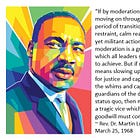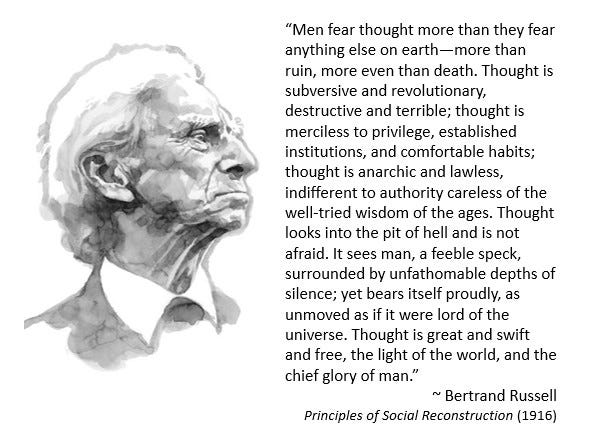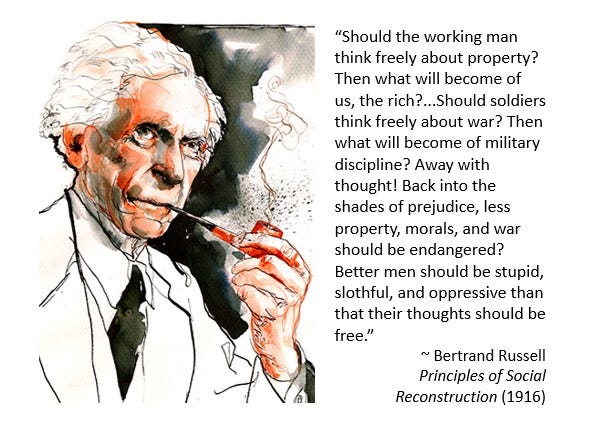Disavowing Fear, Saying No to War
Remembering the Preemptive Protests Against the Iraq War. Part III in a series exploring the 2003 Iraq War
I remember talking to a friend of mine in 2003 about how shocking it was that our government wanted us to go to war with Iraq. To my surprise, my friend viewed military action as a necessary evil. He was no fan of President Bush but said we couldn’t dismiss the threat of Weapons of Mass Destruction (WMD). I pointed out that our government had not proven Iraq had WMD and that we couldn’t just let the Bush administration send our country to war so haphazardly. He rebutted with a mixture of agitation and fear. What did I know, he asked, what could any of us know? We weren’t the ones with access to the important papers, to the intelligence reports. We needed to trust those who did. We needed to trust the president.
This tense but brief exchange with a long-time friend alerted me to the perilous trajectory our nation was on. Many were genuinely terrified at the prospects of Iraq, the “terrorist state,” launching nuclear weapons at our nation. The Bush administration and leaders in both major parties had succeeded in stoking the fear that Iraq posed an existential threat to the United States.
But not everyone was convinced of the Bush administration's claims that Saddam Hussein had WMD or that invading Iraq was the right decision. The preemptive peace movement of 2002 through early 2003, along with the independent thinking elected officials who questioned the rationale of the Iraq War, offer a valuable lesson in the virtues of critical thought and democratic citizenship. Their example deserves to be honored and remembered as we observe the 20th anniversary of the 2003 Iraq War.
Congressional Disobedience: Refusing to Represent Militarism
In the House of Representatives, Independent, Bernie Sanders joined with 126 Democrats, including Barbara Lee and
, and six Republicans, Ron Paul among them, to vote against the 2002 resolution giving the Bush administration permission to invade Iraq. In the Senate, Paul Wellstone and 20 other Democrats joined with the sole Republican, Lincoln Chafee, to vote "no."A minority of principled and perspicacious elected U.S. representatives challenged the Bush administration’s unfounded claims about Iraq and stood up against irrational patriotic fervor.
On August 20, 2002, Kucinich hosted an expert panel offering policy perspectives and context left out of the earlier senate hearing on Iraq. This was a hearing that included the former weapons inspector in Iraq, Scott Ritter. Kucinich began the session explaining he opposed war with Iraq because the administration had not proven that the Iraqi government participated in the September 11 attacks. He also said the government failed to provide adequate evidence “concerning Iraq's possession of weapons of mass destruction or the capability or intent to deliver the weapons."
A minority of principled and perspicacious elected U.S. representatives challenged the Bush administration’s unfounded claims about Iraq and stood up against irrational patriotic fervor. Like Biden, Paul Wellstone was on the Senate Foreign Relations Committee. But he did not share Biden’s unbridled confidence that Iraq possessed WMD nor his narrowness of focus. During the 2002 hearing on Iraq Wellstone asked the committee to grapple with a set of pressing questions.
“What is the precedent for the U.S. to launch a major military operation in the absence of direct provocation by the target country? Should the U.S. action be targeted and covert, or overwhelming and overt? What would we expect the casualties among U.S. service personnel to be in a potential war on Iraq, and would it be higher, as most experts agree, than in the current war in Afghanistan? Are Americans ready to shoulder that burden now? What would the death toll be among ordinary, innocent Iraqi civilians?”
This emphasis on judicious inquiry and ethical concern for not only U.S. soldiers but also the innocent human beings in Iraq went unmatched by most of Wellstone’s Senate colleagues. Fewer than three months after the Iraq hearing in the Senate, Wellstone, his wife and one of his three children were killed in an airplane crash. It was October 25, 2002, two weeks after his vote against the war authorization. They were on their way to a funeral.
To accurately represent the United States’ decision to invade Iraq, in 2003, we must recall the efforts of millions of ordinary people across the globe to stop the ravenous rush to war.
Wellstone’s critical interrogation of the rationale for war, along with his fellow dissenters in the Senate and House of Representatives, prove the lie that “no one could have known at the time” that Iraq did not really pose a threat to the U.S. The case for war was never convincingly argued, and the challenges to invading Iraq were not compellingly overcome. The decision to invade Iraq did not result from a lack of understanding. At best the war was launched due to a lack of courage and reasoned judgment; at worst, it was launched due to sheer mendacity.
Voices of Dissent and Disobedience: Preemptive Protests Against Preemptive War
Though a majority of Americans supported taking military action in Iraq, millions refused to be overtaken by appeals to power and fear. Coordinated protests against the Iraq War began six months before the invasion. On September 29, 2002 a few thousand turned out in Washington, D.C. to preemptively protest the Bush administration's bellicose rhetoric toward Iraq. Speakers included Phyllis Bennis, from the Institute for Policy Studies, and consumer protection advocate and 2000 Green Party presidential candidate,
. The day before, more than 100,000 took to the streets of London while another 100,000 marched in Rome, Italy against the war.To accurately represent the United States government’s 2003 invasion of Iraq we must recall the efforts of millions of ordinary people in the U.S. and across the globe to stop the ravenous rush to war. As the Bush administration and its Senate allies prepared for war and regime change, individual citizens and peace organizations worked to compel the U.S. government to pursue a peaceful resolution with Iraq’s government.
Multiple protests were held in cities like Chicago, Cincinnati, and San Francisco throughout the month of October 2002. About 100,000 marched against war with Iraq in Washington, D.C. on October 26, 2002. The rally took place near the Vietnam War Memorial where an array of speakers called the Bush administration’s belligerent threats of war into question. Those registering their opposition to war included actress Susan Sarandon, Rev. Jesse Jackson, former Attorney General, Ramsey Clark, then house representative, Cynthia McKinney, Ben & Jerry's co-founder, Ben Cohen, and Rev. Al Sharpton.
During the October 26 rally, acclaimed singer songwriter, Patti Smith paid tribute to Paul Wellstone, who had died the day before. “He would not want us to give him a moment of silence. He would want public outcry. And that’s what we must do. We only have a few words that we need to say….No war. No War.” Flanked by an acoustic guitarist, Smith then performed a stirring rendition of her 1988 protest anthem, “People Have the Power.”
“I awakened to the cry
That the people have the power
To redeem the work of fools
Upon the meek the graces shower
It's decreed the people rule”
Listen to Patti Smith’s October 26, 2002 performance of “People Have the Power” here.
The nascent peace movement continued to grow into the new year. On January 18, 2003, over 100 protests took place in cities across the U.S., including San Francisco, Seattle, and Portland. Speakers at the largest rally, in Washington D.C., invoked Rev. Dr. Martin Luther King Jr.'s commitment to nonviolence and opposition to militarism in challenging the Bush administration's rush to war. In his “Beyond Vietnam" speech, delivered April 4, 1967, King decried the U.S. as the “greatest purveyor of violence in the world,” and argued that the nation's prioritization of military spending over social support for citizens' basic needs constituted put the U.S. on the path of “spiritual death.” King spent the last year of his life building a movement to pressure the government to shift its policies and economic priorities from warfare to remedying poverty.
Addressing as many as half-a-million protestors at the January 18, 2003 protest in Washington D.C., Rev. Jessie Jackson called for the nation to heed Rev. King’s insistence that we “fight a war on poverty not a war on the poor.” Instead of attacking Iraq, Jackson, who was part of Rev. King’s inner circle and present during his assassination, called for “minds over missiles and negotiations over confrontation.”
“Why are we here today? Because we choose coexistence over coannihilation. Because we choose brains over bombs and we use brains not brute force to resolve conflict; to stop terrorism and not spread it.”
Outside of the U.S., additional January 18 protests were held in Tokyo, Paris, Cairo, and London. A contingent of workers at the McMurdo Station in Antarctica even joined the action. About 70 researchers and support staff gathered under the slogan, “Not In Our Name,” in open defiance of the station manager's insistence that demonstrations would not be tolerated. They used their bodies to form a giant peace sign against the backdrop of the polar desert.
Too little credit is given to this global effort to thwart the world’s greatest military power from invading another nation. Renowned public intellectual, Noam Chomsky, observed that the opposition to the 2003 Iraq War was unprecedented. Historically, demonstrations against a war begin after the bloodshed begins. For example, the first large scale demonstration against the Vietnam War took place in April 1965, more than a month after intensive U.S. bombing began, when at least 12,000 students amassed in front of the White House.1 By contrast, the peace movement against war with Iraq began before the bombs dropped and the troops were officially deployed.
Consider what it meant for millions of people living in consumer societies to redirect their time and energy away from purchasing products, to turn off their TVs, put down their phones, to alter their plans and gather with strangers; to listen and learn from one another, to march together, to chant together, to heed that resounding ethical injunction to exemplify our values in living practice.
Further consider that many did so in environments where there was little incentive to do so. Activists were often told they could not effect the decided outcome, which was a foregone conclusion; or they were paternalistically scolded that such matters were beyond their scope of knowledge and judgment, and to be decided by their leaders. To properly assess the significance of the peace movement we should recall Rev. King’s observation, in “Beyond Vietnam,” that the dominant cultural currents in society tend to reinforce conformity in the public, especially during times of war.
“Even when pressed by the demands of inner truth, men do not easily assume the task of opposing their government's policy, especially in time of war. Nor does the human spirit move without great difficulty against all the apathy of conformist thought within one's own bosom and in the surrounding world.”
King humbly admitted to being slow to condemn the Vietnam war, himself. When he did speak out, he quickly discovered some of his colleagues in the Civil Rights’ movement lacked the courage to question their government’s foreign policy and objected to King’s vocal denunciation of U.S. militarism.
Many who actively spoke out against the Iraq War refused undemocratic political paternalism and exemplified the vital democratic value of autonomy, self-determination. Citizen activists refused to passively accept the pronouncements issued from government authorities and to simply resign themselves to their decisions. Instead, they embraced the right and responsibility of citizens to express their will and attempt to guide elected representatives.
In refusing to accept the fallacious fear-based appeals of mainstream media and government officials, this protesting public answered the call of the 20th century philosopher and peace advocate, Bertrand Russell to embrace critical thought in favor irrational confidence in authority. In Principles of Social Reconstruction (1916), Russell wrote,
“Men fear thought more than they fear anything else on earth—more than ruin, more even than death. Thought is subversive and revolutionary, destructive and terrible; thought is merciless to privilege, established institutions, and comfortable habits; thought is anarchic and lawless, indifferent to authority careless of the well-tried wisdom of the ages. Thought looks into the pit of hell and is not afraid. It sees man, a feeble speck, surrounded by unfathomable depths of silence; yet bears itself proudly, as unmoved as if it were lord of the universe. Thought is great and swift and free, the light of the world, and the chief glory of man.”
Those who dared to scrutinize uncritical advocacy for invading Iraq, placing the would-be campaign in the wider context of U.S. foreign policy history, embodied precisely this uniquely human capacity for critical and creative thought. As a result of such independent thought, the movement against the war grew, at least initially, despite the active suppression of anti-war voices in the media.
Though activists could not keep the dogs of war at bay, they succeeded in keeping alive an ancient humanism that refuses to permit the ordinary horrors and inhumanity of warfare to be normalized and accepted.
Those in positions of power who prioritize their predetermined political aims over rational and principled thought have an interest in suppressing critical thought. If such thinking were to supplant conformist appeals, ordinary people might begin to question common sense, the ideology of power masked as “the way things are and must be.” Soldiers might even question war, as Russell noted and Patti Smith dreamed. Sardonically writing in the voice of those opposed to critical thought, Russell wrote:
“Should the working man think freely about property? Then what will become of us, the rich? Should young men and young women think freely about sex? Then what will become of morality? Should soldiers think freely about war? Then what will become of military discipline? Away with thought! Back into the shades of prejudice, less property, morals, and war should be endangered? Better men should be stupid, slothful, and oppressive than that their thoughts should be free.”
Russell along with figures like Albert Einstein remained steadfast vocal opponents of militarism through the end of their lives, conscious of the existential threat nuclear warfare posed to humanity itself, as they stated in the 1955 the Russell-Einstein Manifesto. Indeed, the symbol that anti-war protestors formed with their bodies in Antarctica—the peace sign—was created by British artist, Gerald Holtom in 1958 for the Nuclear Disarmament movement. How painfully ironic that activists deploying the peace sign in Antarctica were seeking to prevent a purported war of “disarmament.”
The peace movement against the Iraq War carried forth the criticism of war spoken by the Renaissance philosopher and theologian, Erasmus. In In Praise of Folly (1511), Erasmus, a leading figure of Christian humanism, drew on his faith tradition’s early opposition to warfare in condemning its practice in his day:
“War is such a monstrous pursuit that it's proper only for beasts, not men; so crazy that even the poets suppose Furies bring it upon us; so infectious that it spreads moral corruption far and near; so unjust that it's most effectively waged by the most cruel of thieves; so impious that it's utterly detestable to Christ.”2
Though activists could not keep the dogs of war at bay, they succeeded in keeping alive an ancient humanism that refuses to permit the ordinary horrors and inhumanity of warfare to be normalized and accepted. The early efforts of courageous elected leaders, individual citizens, scholars, and peace groups also set the stage for the largest coordinated global protest in human history on February 15, 2003. This historic human outcry against war and militarism is obscured if not flagrantly blotted out of dominant cultural memory. But it deserves to be remembered, contemplated, and discussed. To this end, part four will do just that.
If you enjoyed this post please share it with others and like it by clicking the heart icon. Be sure to subscribe if you haven’t already.
Invite Dr. Nall to Speak
Dr. Nall delivers energetic live presentations and engaging workshops on the subjects featured in Humanities in Revolt. Those interested in booking a workshop or talk can get in touch through Facebook or by leaving a comment.
This is clearly not an ideal comparison. There are a number of important differences between the Vietnam-war era and the early 2000s. Citizens of the anti-Iraq War movement had significant technological and informational advantages. Yet it could also be pointed out that the absence of the draft in 2002 made the the effort to prevent war ethically unique since most participants were not at risk of being sent to participate in the impending war. Rather than suggesting that one peace movement was better than the other, my point is simply to highlight what deserves to be recognized as novel about the movement against the Iraq War.
The passage is alternatively translated as, “And whereas war is so savage a thing that it rather befits beasts than men, so outrageous that the very poets feigned it came from the Furies, so pestilent that it corrupts all men's manners, so unjust that it is best executed by the worst of men, so wicked that it has no agreement with Christ….”












